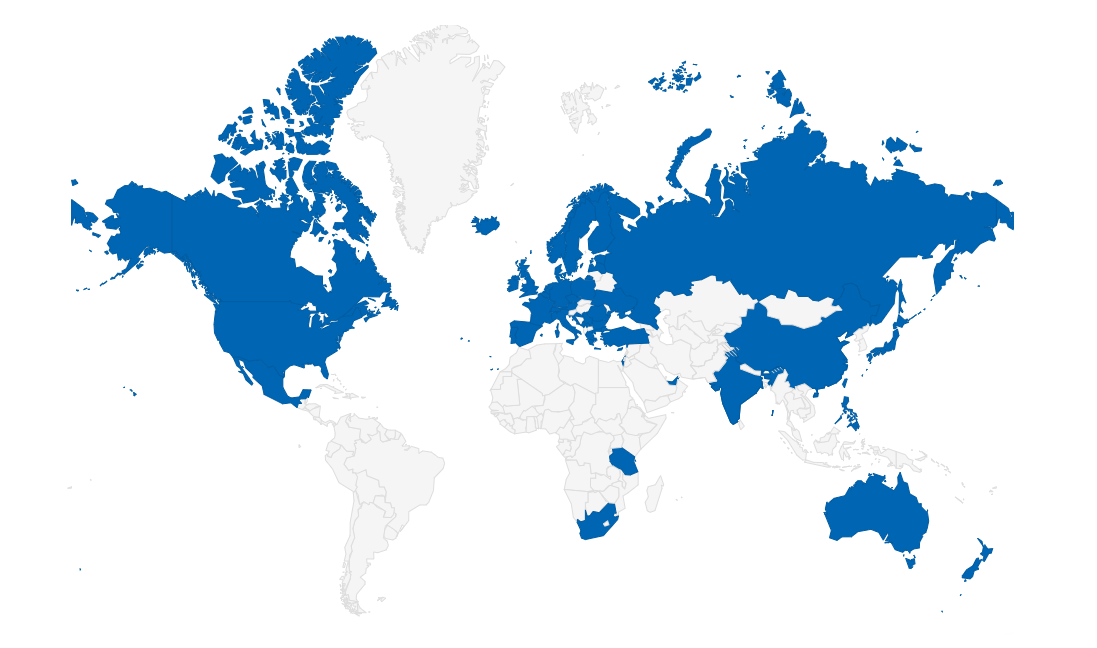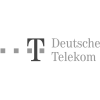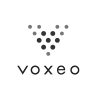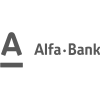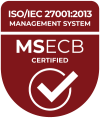- What is software escrow?
An escrow of a (software) source code with a neutral third party (the escrow agency). When licensing software, experience has shown that a wide array of potential points of friction can arise between software developers and their customers (the users). Opinions are often divided once it comes to disclosing the source code, if not earlier. This conflict of interest, which is so typical for the software industry, can be avoided by a so-called escrow agency – an independent trustee with technological expertise who deposits the source code neutrally for both parties.
- What can be protected through Deposix Digital Escrow?
- Digital data / intellectual property (IP) in general
- Artificial intelligence (AI): trainings data (Big Data Pools) und models – cloud based or offline
- Firmware, embedded software
- Construction drawings and plans, maintenance data – for example, for wind turbines
- All types of classic software – classic software licensing model
- Cloud / Software as a Service (SaaS) / Analytics as a Service (AaaS) applications
- Keys / access passwords
- Company data in the event of a company acquisition (Due diligence)
- Procurement lists
- How does the escrow process work?
An escrow contract is closed (typically between 3 parties), and then the deposit material is gathered by the licensor and handed over to Deposix. Deposix checks the material (if necessary via a thorough technical verification – for example, a reconstruction of the software on a neutral computer) and confirms the receival to both parties. Finally, Deposix actively supervises the contract. For example, Deposix takes care of updating the deposited source code, among other things.
- Which points regulate an escrow agreement?
An escrow agreement is a stand-alone contract in which all legal relationships between the three parties ( licensor, licensee and escrow agent) are regulated. Elements of the contract include, for example, the conditions under which the escrow material may be released, update periods, liability matters, and rights to the material.
Deposix is an international escrow provider. Since 2002 we specialize in offering professional repository services for all sorts of Intellectual Property, e.g. software, data, cloud services, keys, etc. We trust in our proven contracts, our proficient service and a secure deposit to create a win-win solution for both, holders and users of Intellectual Property.

Experience
Over 20 years of escrow expertise & leading customers from more than 45 countries.

Security
Profound security concept in accordance with VdS guidelines & proprietary safety concept “Chinese Wall of Escrow”.

Quality
Optimized contract templates & consistent, proactive contract management.
Why Digital Escrow?
These days, Intellectual Property grows massively in importance. Often, it is one of the decisive factors contributing to a company’s success.
Software, IP/know-how in general, cloud services, data, keys… the number of electronic assets is steadily increasing. Their tangibility, however, decreases at the same time.
Deposix will provide you with custom-fit fiduciary solutions for a maximum of security.
Your added value = investment protection + safekeeping of trade secrets
Please try us any time, we’re looking forward to meeting your professional escrow needs!”.
Win-Win with Deposix
We create the greatest possible added value for rights holders and rights users solving the conflict of interest between both contracting parties.
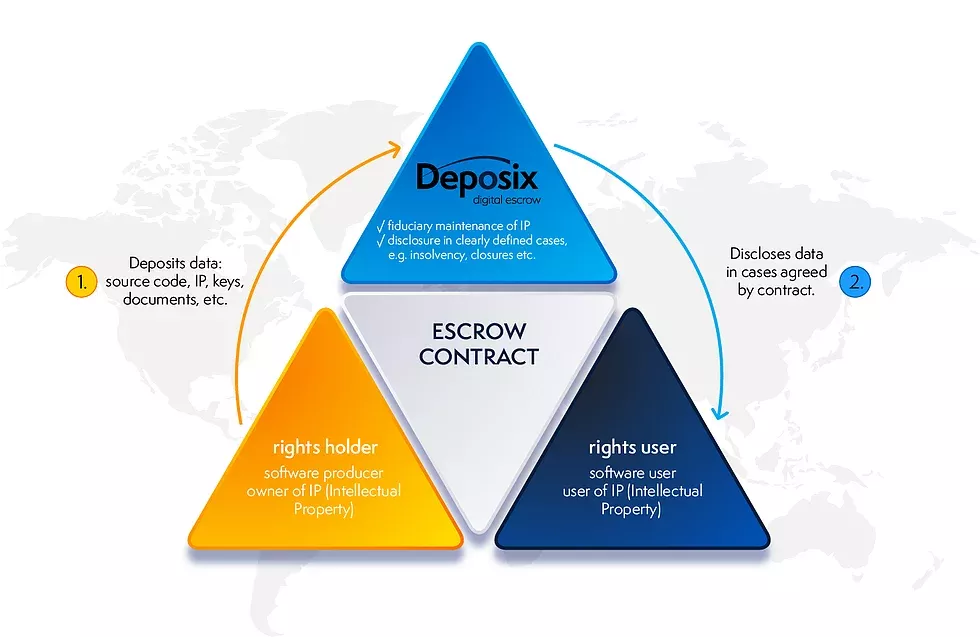
Deposix Digital Escrow
Who should consider fiduciary deposit of their sensitive data?
Rights users
Software users, licensees, rights/IP users
Deposix protects your investments:
- We ensure usability and enhancement of the deposited software, even if the producer fails to perform
- We update the deposited source code regularly
- We conduct a technical verification of the deposited material, including software report and usage warranties
Deposix preserves the value of your investments and supports you with a proactive update management.
Rights holders
Software producers, licensors, rights/IP holders
Software producers, licensors, rights/IP holders:
- We ensure security, consistency and professionality
- We reliably protect your Intellectual Property
- We support you providing your clients with failover and continuity
- You offer you to expand your escrow protection for further products or users at any time
Deposix responds also to your clients’ demands and thereby provides you with clear competitive advantages.
IT/IP attorneys
IT consultants, IT experts
Deposix complements your toolbox with outstanding professionalism:
- We offer you our expertise and know-how that we gained from more than 20 years of escrow experience
- We provide you with standard contracts that have been tried and tested and also approved by legal experts
- We work on solutions customized for the individual needs of your clients together
Deposix assumes the risk and supports you and your clients as trustworthy partner.
Deposix stands for experience, safety & quality, paired with:

Flexibility

Technical expertise

Focus

Pioneer
Flexible contract design and a customized scope of service is our daily business. Moreover, we offer additional services, e.g. software assessment reports.
We offer the entire range of technical verifications: software assessment reports, Cloud/SaaS escrow, immediate support of different developer platforms, Artificial Intelligence, etc.
We have a profound understanding of economic and technical correlations on hand, which enables us to focus entirely on our clients’ needs.
As a member of the Escrow Community and the “Organisation pro Software Escrow”, we actively support future-oriented topics, i.e. cloud computing/SaaS, Data and AI Escrow.
Questions?
Deposix Digital Escrow Services
Our range of services
Escrow contracts
Deposix offers a wide range of tried and tested standard escrow contracts:
- Individual contract
- Collective contract licensor
- Collective contract licensee
- Cloud services (SaaS and AaaS)
- Data & documents
- Keys
If you interested, we are more than happy to provide you with one of our sample escrow contracts.
Deposit & deposit management
Deposix guarantees highest safety standards for the entire process:
- Tried and tested depository agreements
- Extensive standardized initial inspection
- Deposit in an environment similar to a data center
- Full audit trail for all deposits
- Deposit statement after every update
- In case of discloure: professional management as active, neutral partner
Verification & software report
Deposix assures the usage of your IP for future developments. We offer the following inspections:
- Documentation check: complete, transparent documentation
- Plausibility check: check on compileability
- Compile – build – run: executable object code
- Function check: check on functionality
- Code check: review of programming
All verifications guarantee the technical completeness required for a deposit. This service can also be provided as an independent service.
You prefer development platforms for your deposit?







We want to make depositing and updating data as convenient as possible for our clients. Therefore, we support (apart from standards as DVD, sFTP, etc.) data transmission via development platforms, i.a.:
- GitHub
- GitLab
- Bitbucket
- dockerhub
- AWS
- Azure
Our customers? Are excited!
“We at Because Software have been offering our customers escrow deposits with Deposix for over 12 years.
A regular technical verification of the code through an escrow agency is wise – we welcome it, as it helps promote the quality of our own software.”
Lorenz Mrkos
Executive of Because Software AG
“Technical verifications regarding a deposit are a suitable means of bettering the general quality of software and the upstream development in the interest of all parties.”
Hannes Bergsmann
Founder and CEO of the Software Quality Lab GmbH from Linz, Austria
“Many thanks for the quick and professional handling of all contract related matters. An extra star for the trustworthy and pleasant update reminders. Great service!”
Lead developer of a well-known international company
Deposix Escrow – with customers in over 45 countries!
